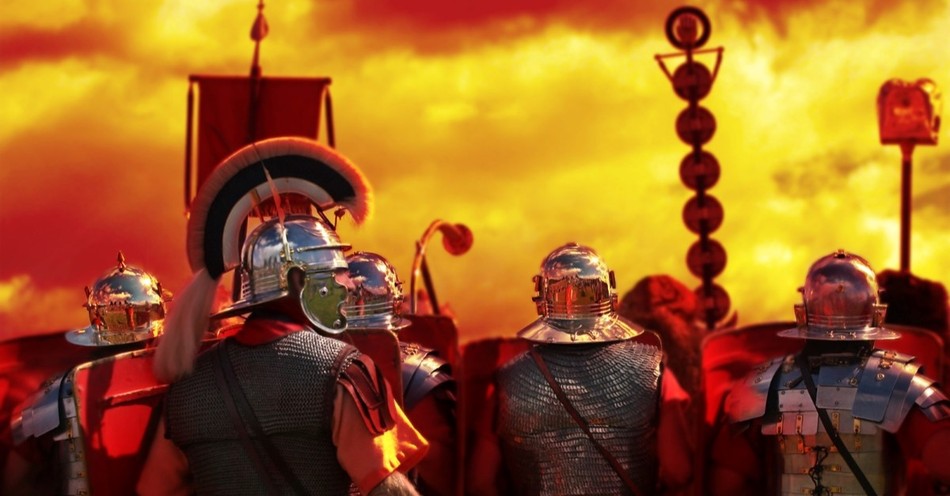Throughout the church’s history, countless saints came to faith in miraculous ways—from healing to visions to visitations and even seeing Christ face-to-face
These visions and visitations were initially reserved for the Jews who followed Jesus—the disciples, his parents, and his other followers. As the Gospel spread, Gentile followers of Christ would also receive visions and visitations. One of these Gentile figures in the Scripture is Cornelius the Centurion (or St. Cornelius in liturgical denominations). He is even known as the first Gentile Christian.
Let’s dig into how and why he’s known as the first non-Jew to accept Christ.
Where Does the Bible Mention Cornelius?
Cornelius is first mentioned by name in Acts 10. He was a Roman Centurion—a mid-level position in the Roman Empire’s military.
A Roman military legion consisted of 5,000-6,000 men, roughly 70-80 being centurions. Cornelius’ role likely consisted of leading 100 soldiers in times of war. Scripture specifies that he was of the Italian Cohort (Acts 10:1). He would typically oversee the day-to-day life of his soldiers and report to the hire-ups when required. While a centurion’s position was under the senior officer staff, sometimes the Roman Emperor personally appointed them. Needless to say, Cornelius’ military position would have given him a high reputation along with high pay.
While Cornelius is mentioned in only one chapter in Acts, that whole chapter revolves around him and his interaction with the apostle Peter. Before moving forward, it is worth noting that some scholars and theologians have pondered the possibility that Cornelius was the same centurion that witnessed Christ’s crucifixion in Mark 15, who famously said, “Truly this man was the Son of God.” We will later dig into whether this is a possibility.
What Happened Before Peter Visited Cornelius?
Luke reports in Acts that even before Peter visits Cornelius, the centurion was a devout man who followed God—as did the rest of his household, which probably consisted of his immediate family, some relatives, and even indentured servants.
The text doesn’t specify whether “devout and God-fearing” means he already believed in Jesus—many people knew of Jesus, either by seeing him or studying under John the Baptist, but hadn’t received the Holy Spirit yet (Acts 19). If he was the centurion at the foot of the cross, the centurion who professed Christ’s deity and humanity, then his life was changed from that day forward and would never be the same again. Regardless of whether Cornelius was the same centurion, his faith in God was strong and deep.
As a result of his faith, he receives a vision from an angel. The angel gives him specific instructions to bring Peter to his home by his soldiers (Acts 10:4-8). Without hesitation, Cornelius does as he is asked.
What is striking about this quick response is obedience. Throughout the Old Testament and the Gospels, we see God’s followers either ask for sign after sign (like Gideon) or try to dodge their calling (like Moses). Few obey without hesitation and in humbleness. Cornelius may have had many questions, but he nonetheless answers the call.
Contrast this with Peter’s response. He receives a vision (Acts 10:9-17) that puts him in contradiction with Jewish customs. By this point, Peter has seen Jesus’ ministry and love for Jews and Gentiles through His miracles and teachings, along with other groups, such as the Samaritans. Furthermore, Christ told Peter before his Ascension to go into the world and preach the Gospel to all nations (Acts 1:6-11).
Despite what Peter witnessed as Christ fulfilled the Old Testament Law and Prophecies while uniting Jews and Gentiles, Peter questions his vision as the various forms of meat appear before him. Luke records this happening three times (Acts 10:16).
The scene is not unlike Mary and Zechariah—two faithful people of God connected to each other who receive visions but have different responses. This is not to lower Peter’s significance but to shed light on what we can learn about these two believers (more on that later).
After Peter accepts the call from God, Cornelius’ soldiers visit him. The Holy Spirit tells him to answer and follow them.
What Happened When Peter Arrived at Cornelius’ House?
After arriving at Cornelius’ home, Cornelius not only immediately greets Peter but also brings his whole household—his wife, kids, servants, guards, and extended relatives (Acts 10:23-24).
Cornelius falls before Peter in worship (Acts 10:25-26), and Peter corrects him in humility by telling him to “stand up; I too am a man.” This interaction often happens in the Scriptures—men and women fall before the feet of messengers and prophets in worship, whether out of fear of the Lord or deep veneration;
It is important to note that Peter’s type of correction also happens with other apostles in Acts. We see this with Paul and Barnabas, treated like gods by Gentiles because they healed someone—though they immediately correct the people (Acts 14:8-18). In these interactions, the apostles correct and point people toward the truth, as we shall see Peter did with Cornelius.
When Cornelius explains his vision, Peter recognizes that God shows no partiality and that the great divide between Jews and Gentiles is now mended together in the Kingdom of God (Acts 10:27-43). After this realization and proclamation of the Gospel, Peter baptizes Cornelius and all those of his household (v. 44-48).
Cornelius’ story ends here, in Scripture wise. In church tradition, mainly the Roman Catholic Church, it is said that Cornelius retired from the Roman military and went to accompany Peter in preaching the Gospel. Another tells of how he was seized by a pagan prince, Prince Demetrius, who was furious with his conversion and forced him to sacrifice to the Greek god Zeus in the temple. In response, Cornelius is said to have prayed facing east toward Jerusalem, and a great earthquake broke down the temple. Originally imprisoned, the prince soon came to him for prayer after discovering that his wife and kids were trapped beneath the rubble. Cornelius prayed, and the prince’s family survived. As a result, they were baptized into the faith. It is also said that Peter made him Bishop of the city until his passing.
Why Was Cornelius Becoming a Christian Shocking?
Let’s look at this story’s context. Throughout the Gospels, Jews were frowned upon if they were mingled with Gentiles, especially if they worked for them (case and point, Matthew being a tax collector). It was seen as a betrayal not just because of the Old Testament Law (though that was a big reason).
The previous several hundred years of Jewish history also factored into this situation. The intertestamental Book of Maccabees records the Maccabean rebellion, where the Jews successfully fought for their freedom against Gentile rulers. They fought for their freedom against empire after empire, only to fall under Roman rule.
Contrast this with Romans. The Roman Empire stretched from the edge of Spain to the Black Sea, overseeing the Mediterranean. It is one of the largest empires to have existed and lasted for 14 centuries (if you include the Eastern Roman Empire, also known as the Byzantine Empire). Yet, within such a multicultural empire comes civil unrest among minority groups. The Jewish people were no exception. As if the Jewish people did not cause instability for Pontius Pilate already, then came Jesus Christ, whose trial caused a great stir between the Romans and the Jewish people.
Particularly at this time, there was bitterness and rivalry between Gentiles and Jews. Therefore, it isn’t surprising that Peter would hesitate to be around unclean food or Gentiles. Even after Christ’s resurrection, the Apostles still asked when Christ would overthrow their Roman rulers and establish his kingdom on earth (Acts 1:6-7). His final command to them was to preach the Gospel to all those of the world, in other words, reach the Gentiles (Acts 1:8).
Consider Cornelius’ status. With his military rank and reputation, bringing a Jewish man into his home–let alone a poor Jewish man– was almost unthinkable. The same can be applied to Peter, who mentions to Cornelius how unlawful it is to be associated with him by Jewish law and standards (Acts 10:28-29). Yet Cornelius and Peter were willing to do as God asked.
Can We Learn Anything from Cornelius the Centurion?
Before the coming of Christ, those outside of Israel brought into the covenant were required to have circumcision and follow Jewish law. Due to racial division, customs, politics, and religious practices, the Jews people created more division between them and Gentiles in the latter centuries. When Christ comes into the picture, he brings the two together through his crucifixion, death, and resurrection.
Even after Christ’s Ascension, the division between Jewish and Gentile Christians emerged, as seen in Paul’s letter to the Church of Galatia. As he famously stated:
“Now before faith came, we were held captive under the law, imprisoned until the coming faith would be revealed. So then, the law was our guardian until Christ came, in order that we might be justified by faith. But now that faith has come, we are no longer under a guardian, for in Christ Jesus you are all sons of God, through faith. For as many of you as were baptized into Christ have put on Christ. There is neither Jew nor Greek, there is neither slave nor free, there is no male and female, for you are all one in Christ Jesus. And if you are Christ’s, then you are Abraham’s offspring, heirs according to promise.” (Galatians 3:23-29)
Photo Credit: © Getty Images/standby

This article is part of our People of Christianity catalog that features the stories, meaning, and significance of well-known people from the Bible and history. Here are some of the most popular articles for knowing important figures in Christianity:
How Did the Apostle Paul Die?
Who are the Nicolaitans in Revelation?
Who Was Deborah in the Bible?
Who Was Moses in the Bible?
King Solomon's Story in the Bible
Who Was Lot's Wife in the Bible?
Who Was Jezebel in the Bible?
Who Was the Prodigal Son?


.jpg)
